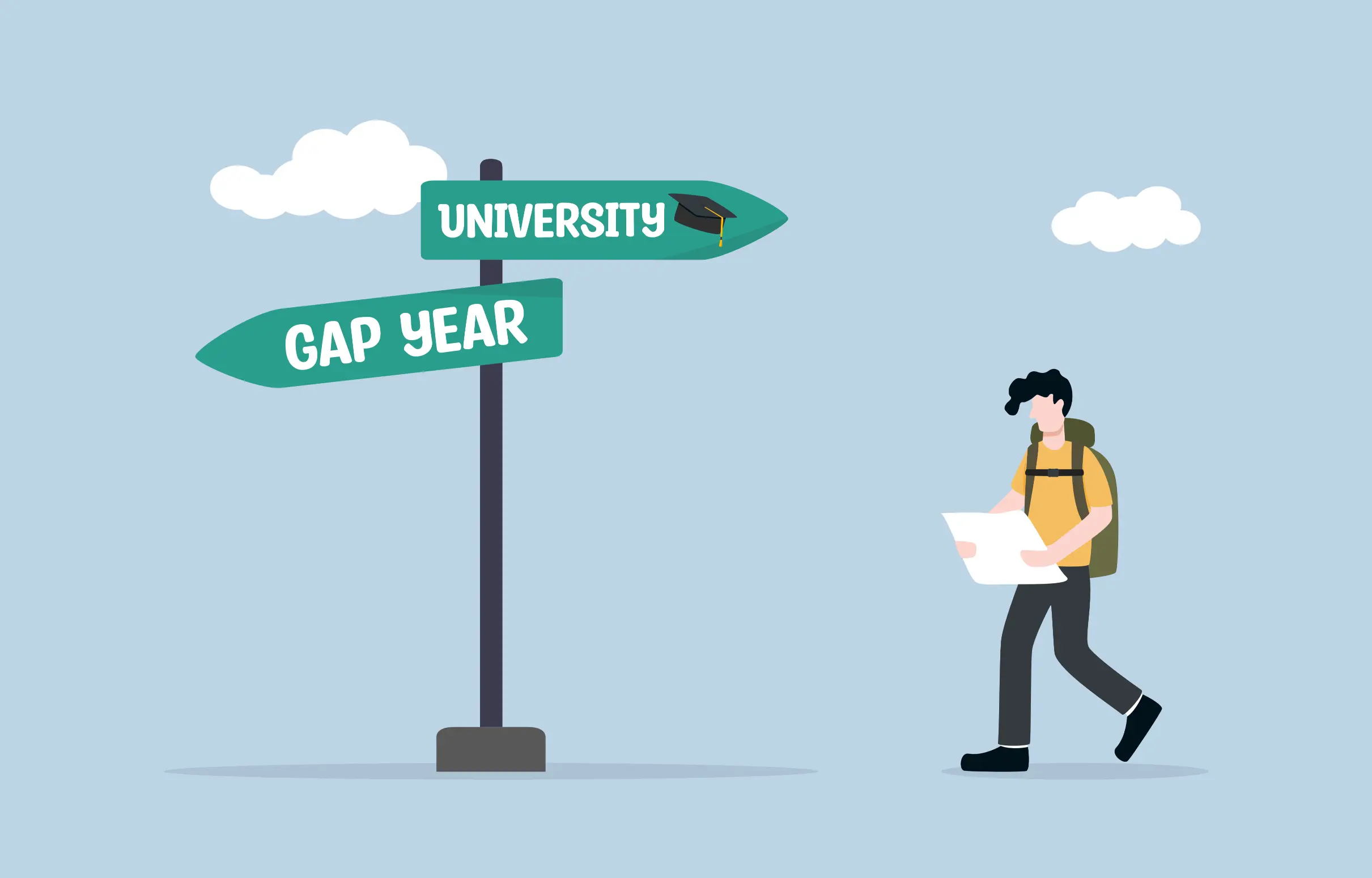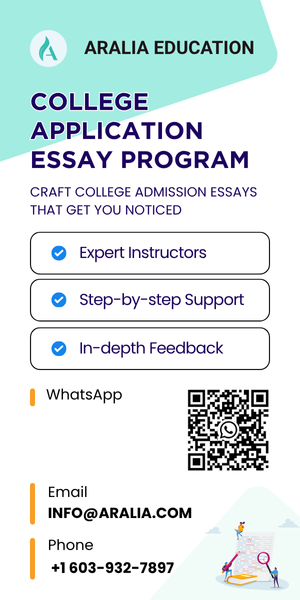Make Your Gap Year Count—Stand Out with Aralia Classes
1. What is a gap year?
According to the Gap Year Association, a Gap Year is “a semester or year of experiential learning, typically taken after high school and prior to career or post-secondary education, in order to deepen one’s practical, professional, and personal awareness.”
Historically, gap years started to become popular in the 1960s, when the then young Baby Boomers wanted to escape the war. Initially, gap years were aimed at fostering experience to prepare young people for work in growing industries, and consequently spark the growth of such industries. Nowadays, it is typically time off between high school and college or university; this period can be used for traveling, working, volunteering—whatever activity is most beneficial to the specific individual. Thus, a gap year allows students to explore opportunities they would not have been able to otherwise.
Taking a gap year has become an increasingly popular choice among high school graduates. Within this period of time, individuals can discover their interests and passions and also sort out finances before they devote four years to college studies. Generally, people take a gap year right after graduating from high school and before starting a university education.
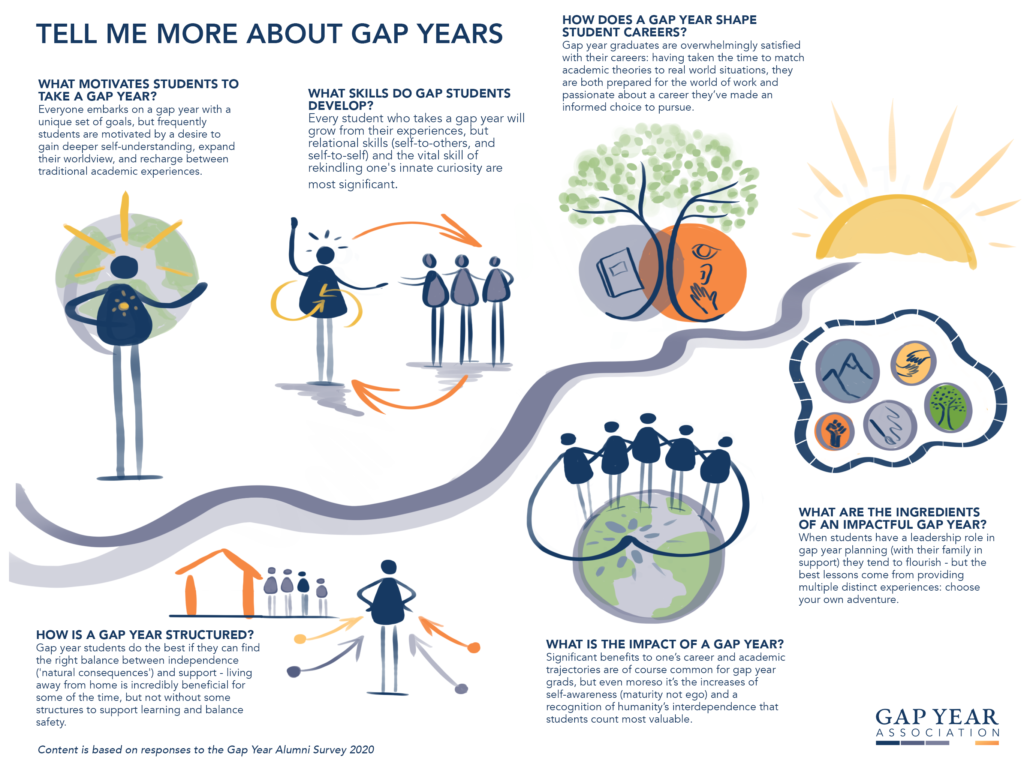
There are many reasons students choose to take a gap year. American Gap Association (AGA) surveyed participants from 18 to 60 years old who have taken a gap year to better understand what things motivate students to take a gap year.
The survey showed that most students decide to take a gap year for personal and/or academic reasons, like exploring future career options or gaining more life experience . However, the ability to take a gap year depends greatly on your financial situation. Students living in families with lower incomes may need to work after high school graduation to fund their college educations. In contrast, students whose families have higher incomes are usually more able to take time off, and have the freedom to choose their activities without financial worries.
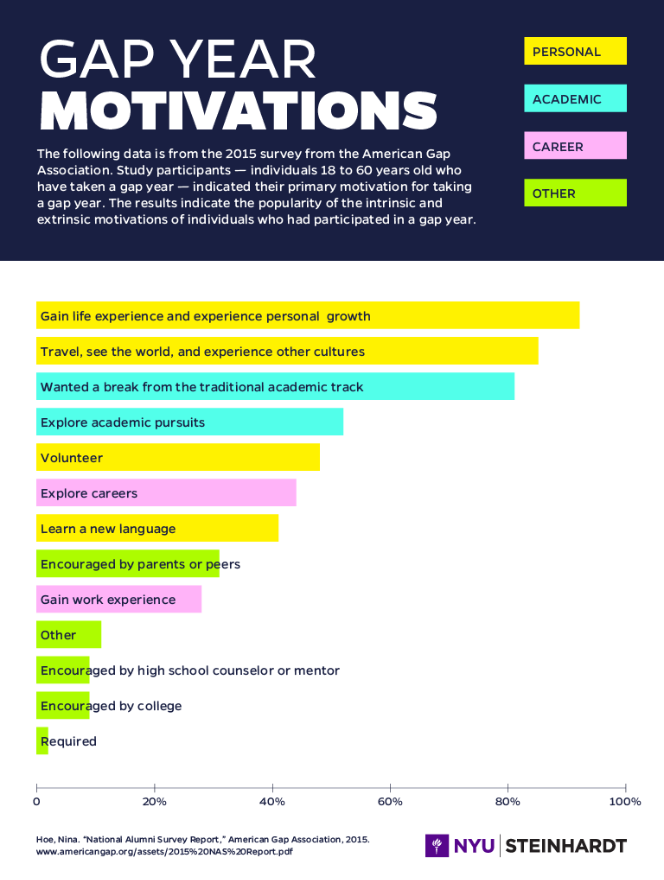
In the survey conducted by American Gap Association, participants were also asked to provide their academic results after their gap year. The gap year allows students more downtime; therefore, it’s an excellent time to reflect and focus on personal and professional development. The complete response can be found below:
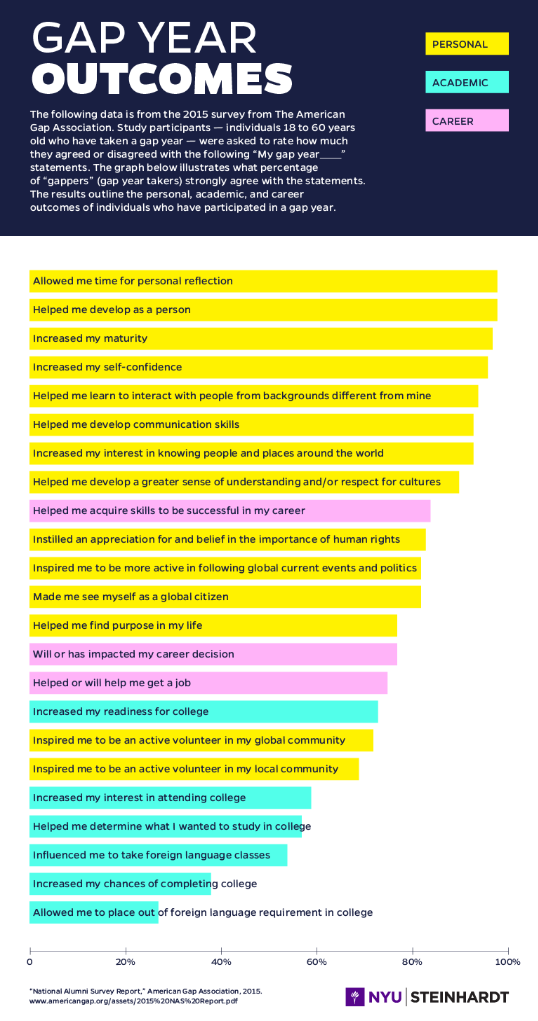
2. When can you take a gap year?
Even though taking a gap year right after high school is the most popular option among students, it’s not the only one. Many students also choose to take a gap year during or after college. The popular reason behind taking a gap year before college is that students want to discover their passions to choose the right major in college.
However, some students benefit more from taking a gap year while in college. A few popular reasons for this choice are that students want to explore different academic or professional fields, or gain more work and life experience before entering the “real” world. Some students also spend this time traveling, volunteering, and doing meaningful work to enrich their perspectives and experiences, while not worrying about commitments and grades.
Additionally, after graduating from college, some students may not feel ready for the pressures of the working world, such as finding a job or networking with professionals in their field. These students often seek a post-college gap year during this time. However, taking time away from the job market post-college for more than 3 months can pose some challenges. Due to the gap between school and work, employers may ask you to explain the gap in your resume, so it’s important to have a productive explanation for your choice.
3. Why should you take a gap year?
Experience the world before entering the adult world
Going straight into the adult world can be challenging for students, especially when you jump directly from one academic world to another, and then straight into the workforce. The constant stress of such demanding environments can be overwhelming, so we recommend you take a break in between if you need to. A gap year gives you time to think through critical points in life, while also navigating your personal goals and growth. Life is about more than just getting good grades or being a good student. There are very tangible benefits to leaving your comfort zone to explore the world through experiential learning. You could travel to a destination on your bucket list, immerse yourself in new cultures, or volunteer for a non-profit organization. The options are endless, and no matter which option you choose, you will grow from your experience.
Avoid academic burnout from high school and college
When you’re in school, your life is always burdened by a full schedule, from classes to extracurricular activities and homework, you can feel like a non-stop race without a pause button. Because of the go-go-go nature of academic life, it isn’t uncommon for students to face academic burnout. Taking a gap year is an excellent option to recover and solidify your academic motivations before returning to school.
Experience the world before entering the adult world
Going straight into the adult world can be challenging for students, especially when you jump directly from one academic world to another, and then straight into the workforce. The constant stress of such demanding environments can be overwhelming, so we recommend you take a break in between if you need to. A gap year gives you time to think through critical points in life, while also navigating your personal goals and growth. Life is about more than just getting good grades or being a good student. There are very tangible benefits to leaving your comfort zone to explore the world through experiential learning. You could travel to a destination on your bucket list, immerse yourself in new cultures, or volunteer for a non-profit organization. The options are endless, and no matter which option you choose, you will grow from your experience.
Find yourself and your purpose
Taking a gap year is mainly about finding yourself and your purpose. Some students know exactly what they want to do for their future careers by or before high school, but most don’t. By taking the time off to discover what you enjoy doing and explore your interests, you can return to school and take advantage of all available resources to help you succeed in a major that you’re truly passionate about.
Improve your interpersonal skills
A gap year can provide an excellent opportunity to develop social and interpersonal skills such as communication, problem-solving, and collaboration. These skills are highly sought after by employers and universities, as they are essential for success in various career paths. Gaining experience through a gap year can give you the edge over other applicants and make you more attractive in college and career applications. Taking a gap year offers an excellent opportunity to hone interpersonal skills. For instance, venture out and explore new countries while volunteering abroad! Immerse yourself in different cultures and learn how to adapt, and communicate with people from diverse backgrounds while developing abilities like problem-solving strategies and conflict-resolution techniques. Taking a gap year can also give you an excellent head-start networking in your fields of interest. Plus, you can gain top leadership qualities by taking the initiative to get engaged with disciplines and organizations that you’re interested in; for example, you could consider leading community service or volunteer projects in your community, which can help foster teamwork as well.
Overall, taking a gap year can be an excellent way for students to gain valuable experience and knowledge before entering the adult world. It can help curb anxiety about future opportunities by allowing you to explore your passions, develop essential skills, and find your purpose. If you’re feeling stuck and need a break, consider taking a gap year to reset and re-center!

